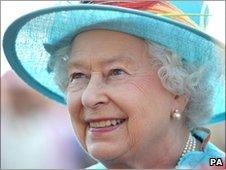Taxpayer paying less to keep Royal Family
- Published

The Queen used funds from reserves to boost her Civil List
The cost to the taxpayer of the Royal Family fell to 62p per person in the UK last year - a drop of 7p, according to Buckingham Palace accounts.
The total cost of keeping the monarchy decreased by £3.3m (7.9%) to £38.2m during the 2009-10 financial year.
The accounts also showed the Queen used reserve funds to boost her Civil List by £6.5m in 2009.
This is the highest amount ever taken from the reserves, which come from surplus Civil List money in the 1990s.
However the figures do not include the cost of security for the Royal Family.
'Headcount freeze'
A Palace spokesman said the fall was mainly due to a reduction in commercial charter flights and a refund of lease rentals from the Queen's helicopter.
The decrease represented a drop of 12.2% in real terms, the spokesman added.
Sir Alan Reid, Keeper of the Privy Purse, said: "The Royal Household is acutely aware of the difficult economic climate and took early action to reduce its Civil List expenditure by 2.5% in real terms in 2009.
"We are implementing a headcount freeze and reviewing every vacancy to see if we can avoid replacement. Property services funding will be reduced by £500,000 this year.
He added: "Work will continue on assessing the condition of the Estate, but it is acknowledged that the necessary cuts in public expenditure will have an impact on the backlog of essential maintenance which it is hoped can be addressed in the longer term.
"In the meantime, the Household is continuing to pursue opportunities to reduce costs and generate income from the Estate's assets, including commercial lettings and management charges."
Despite the Palace insisting travel costs had been curbed, a series of five - and in one case six-figure - sums were incurred for royal journeys.
The total cost of flights for the Queen and Prince Philip's trip to Bermuda and Trinidad and Tobago in November 2009 was £373,470.
On top of that, an additional £22,464 was spent for staff to fly out prior to the couple's arrival and an extra £51,463 was spent on two reconnaissance visits by staff in May and September.
It also cost £21,002 for the Royal Train to take the Queen and Duke of Edinburgh to the Royal Variety Performance in December 2009.
The Duke of York had a number of big travel bills, often for trips relating to his role as a trade representative. They included £94,500 for him to fly to Canada and then on to Azerbaijan.
Travel expenses for the Prince of Wales included £14,756 to take the Royal Train from London to Cumbria to launch the Red Squirrel Survival Trust. A visit by the Prince and the Duchess of Cornwall to Italy and Germany cost £85,700 in charter flights.
The current level of funding has been in place since 2000, but the Civil List itself dates back to 1760 when income from the Crown Estate was paid to Parliament in exchange for the payment of a fixed yearly sum.
In 2009-10, the Queen received £7.9m from the government for her Civil List which when added to the sum from reserves made a total of £14.2m, an increase of £300,000 on 2008-09.
'Time of austerity'
Chancellor George Osborne said in his Budget last month that the £7.9m figure originally agreed by then Prime Minister John Major in 1990 would remain frozen for at least another year.
Human rights campaigner Peter Tatchell is a supporter of the campaign group Republic, which favours the abolition of the monarchy.
He took part in protests organised by the group on Monday outside Buckingham Palace and said: "At a time of austerity and public spending cuts, the monarchy should not be exempt."
He said the Civil List should face the same cuts as all other government expenditure and said the monarchy needed to be replaced with a "low-cost, purely ceremonial elected head of state".
"While the official cost of the monarchy is £38m, the real cost is £100m when you take into account security and local civic receptions for the royals," he said.

- Published22 June 2010